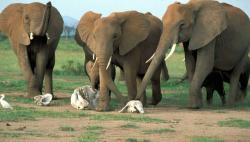Untitled Document
 |
Enlarge
imageThe elephants showed a strong preference towards an elephant
skull (middle) rather than the skulls of a buffalo or a rhino |
Elephants may pay homage to the bones of dead relatives in their home ranges,
a study of the creatures’ responses to skulls and ivory suggests.
Humans apart, only a few animals show any interest in their own dead. Chimpanzees
show prolonged and complex behaviours towards a dead social partner –
but abandon them once the carcass starts decomposing. But lions, for example,
might sniff or lick a dead member of its own species before proceeding to devour
the body.
African elephants have been observed to become highly agitated when they come
across the bodies of their own, and they have been seen to pay great attention
to the skull and ivory of long-dead elephants. However, this interest had not
been tested experimentally.
Now research from a team in the UK and Kenya has demonstrated that African
elephants pay a higher level of interest to elephant skulls compared with those
of other animals and ivory compared to wood.
However, the team could not corroborate stories that elephants specifically
visit the bones of dead relatives. The elephant families in their study were
unable to pick out the skull of their dead matriarch from other families’
dead matriarchs.
“But their interest in the ivory and skulls of their own species means
that they would be highly likely to visit the bones of relatives who die within
their home range,” writes the team, lead by Karen McComb at the University
of Sussex, UK.
Large brains, long lived
“It begs the question why do they do this? This interest in remains of
animals, long-dead, hasn’t really been observed in any other species apart
from humans,” McComb told New Scientist.
She also notes that recorded interest in the dead has been seen in elephants
and chimps - “two very social species, with quite complex structures,
large brains and who are long-lived”. She speculates: “It may be
connected with particular cognitive abilities or aspects of social behaviour."
“Elephants are highly intelligent and highly tactile animals,”
says David Field, head of animal care for London and Whipsnade Zoos in the UK.
“The fact they are able to distinguish between their own skulls and those
of other species is not surprising.”
“Elephants themselves are a matriarchal society filled with aunties and
family members who have close bonds within a group," he adds. A death in
the family might be a significant social event. “It could have an impact
on social bonding and structure within the group,” he told New Scientist.
Smelling and touching
McComb and colleagues studied African elephants (Loxodonta africana) living
in Amboseli National Park, Kenya. Families of elephants were presented with
objects by placing them about 25 metres away from the nearest elephant and then
driving away and observing the reaction of animals.
In one experiment, 17 families were presented with skulls from an elephant,
a buffalo and a rhinoceros. The elephants showed considerable interest in the
skull of their own species. They did this by smelling and touching individual
objects with their trunks and occasionally touching them lightly with their
feet.
In another experiment, 19 families were presented with an elephant skull, a
piece of ivory and a piece of wood. The creatures showed a strong preference
for the skull over the other two objects, and for the ivory over the wood.
The third experiment tested three elephant families who had recently lost the
head of their family. Each was presented with three skulls of matriarchs including
their own – but they did not show a preference for their relative’s
skull.
The notion of elephant graveyards – where old elephants wander off to
die – has been exposed as myth by previous studies, the researchers note.
Nonetheless, they believe their experiments “cast light” on why
elephants are often seen interacting with the skulls and ivory of dead companions.
But there is no way to tell whether the elephants are mourning their dead –
although they get very excited when approaching carcasses, with secretions streaming
from their temples.

